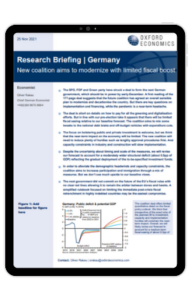Germany | New coalition aims to modernize with limited fiscal boost

The SPD, FDP and Green party have struck a deal to form the next German government, which should be in power by early-December. A first reading of the 177-page deal suggests that the future coalition has agreed an overall sensible plan to modernize and decarbonise the country. But there are key questions on implementation and financing, while the pandemic is a near-term headache.
What you will learn:
- The deal is short on details on how to pay for all the greening and digitalisation efforts. But in line with our pre-election take it appears that there will be limited fiscal easing relative to our baseline forecast.
- The focus on bolstering public and private investment is welcome, but we think that the near-term impact on the economy will be limited.
- Despite the uncertainty about timing and scale of the measures, we will revise our forecast to account for a moderately wider structural deficit (about 0.5pp of GDP) reflecting the gradual deployment of the to-be-specified investment funds.
Tags:
Related Services

Post
US Rolls Up Welcome Mat for International Travel
Research Briefing Germany | New coalition aims to modernize with limited fiscal boost Trump tariffs set to raise effective rate above 1930s levels.
Find Out More
Post
Initial takeaways from Trump’s ‘Liberation Day’ announcement
In two or three years' time, US imports could fall by around 15% due to discounted reciprocal tariff hikes.
Find Out More